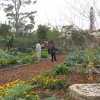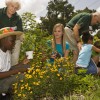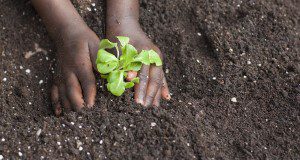Soils are a foundational component of the landscape, providing a medium for plant root growth and playing a crucial role in nutrient cycling and water movement across the landscape. This new 7-page article describes the physical properties of soils, including soil formation in Florida, the soil profile, and water dynamics within soils, and provides a thorough reference for Master Gardeners and other individuals searching for a basic understanding of soil dynamics to apply to residential landscapes. Written by Amy L. Shober, Alexander J. Reisinger, Mary G. Lusk, and Sally Ann Scalera and published by the UF/IFAS Department of Soil and Water Sciences.
https://edis.ifas.ufl.edu/mg458
Tag: Master Gardener Program
Demonstration Gardens in the University of Florida Cooperative Extension Service
 UF/IFAS Extension supports a network of demonstration gardens throughout the state. These gardens showcase plants and practices appropriate for their locations and are open to the community free of charge. Learning opportunities abound for home gardeners and landscape professionals on design, planting, and maintenance procedures. The gardens typically have interpretative materials available, including signs, brochures, and self-guided tours. Many are sites for gardening festivals, workshops, and plant sales. This 27-page directory was written by Sydney Park Brown, Kim Taylor, and Emily Eubanks, and published by the UF Department of Environmental Horticulture, March 2014.
UF/IFAS Extension supports a network of demonstration gardens throughout the state. These gardens showcase plants and practices appropriate for their locations and are open to the community free of charge. Learning opportunities abound for home gardeners and landscape professionals on design, planting, and maintenance procedures. The gardens typically have interpretative materials available, including signs, brochures, and self-guided tours. Many are sites for gardening festivals, workshops, and plant sales. This 27-page directory was written by Sydney Park Brown, Kim Taylor, and Emily Eubanks, and published by the UF Department of Environmental Horticulture, March 2014.
http://edis.ifas.ufl.edu/ep108
Socio-Demographic Characteristics and Concerns about Water Quality Issues of Master Gardener Program Volunteers
 To respond to residents’ informational needs, the Cooperative Extension Service offers a variety of volunteer training and certification programs. Who participates in such programs? What types of audiences are being reached? Do such programs increase knowledge and change behavior of the volunteers? In this article, we attempt to answer these questions by summarizing existing studies and using responses to a regional public survey, and by focusing on the Master Gardener program and surface water quality issues as examples. This 7-page fact sheet was written by Tatiana Borisova, Michael Smolen, Maria Pilar Useche, Jon Calabria, Nickola Sochacka, Damian Adams, Diane Boellstorff, Jason Evans, and Robert Mahler, and published by the UF Department of Food and Resource Economics, May 2014.
To respond to residents’ informational needs, the Cooperative Extension Service offers a variety of volunteer training and certification programs. Who participates in such programs? What types of audiences are being reached? Do such programs increase knowledge and change behavior of the volunteers? In this article, we attempt to answer these questions by summarizing existing studies and using responses to a regional public survey, and by focusing on the Master Gardener program and surface water quality issues as examples. This 7-page fact sheet was written by Tatiana Borisova, Michael Smolen, Maria Pilar Useche, Jon Calabria, Nickola Sochacka, Damian Adams, Diane Boellstorff, Jason Evans, and Robert Mahler, and published by the UF Department of Food and Resource Economics, May 2014.
http://edis.ifas.ufl.edu/fe942
